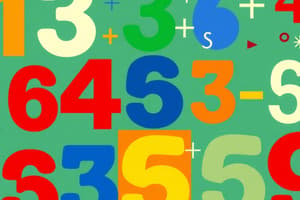Podcast
Questions and Answers
What are natural numbers?
What are natural numbers?
- Any number that can be expressed as a fraction
- 0, 1, 2, 3, 4, ...
- Negative or positive whole numbers
- 1, 2, 3, 4, ... (correct)
Define whole numbers.
Define whole numbers.
0, 1, 2, 3, 4, ...
What are integers?
What are integers?
Negative or positive whole number
What is a rational number?
What is a rational number?
Define an irrational number.
Define an irrational number.
What is the commutative property?
What is the commutative property?
What does the associative property state?
What does the associative property state?
Explain the additive identity property.
Explain the additive identity property.
What is the multiplicative identity?
What is the multiplicative identity?
Define the multiplicative property of zero.
Define the multiplicative property of zero.
What is the multiplicative property of negative one?
What is the multiplicative property of negative one?
Describe the reflexive property.
Describe the reflexive property.
What does the symmetric property state?
What does the symmetric property state?
Explain the transitive property.
Explain the transitive property.
What is the substitution property?
What is the substitution property?
Define deductive reasoning.
Define deductive reasoning.
What is a counterexample?
What is a counterexample?
What is an open sentence?
What is an open sentence?
Explain inductive reasoning.
Explain inductive reasoning.
Flashcards are hidden until you start studying
Study Notes
Number Sets
- Natural numbers consist of 1, 2, 3, 4,... Also known as counting numbers.
- Whole numbers include 0, 1, 2, 3, 4,..., encompassing all natural numbers plus zero.
- Integers are all whole numbers, both negative and positive, including zero.
Types of Numbers
- Rational numbers can be expressed as fractions, including integers and finite/recurring decimals.
- Irrational numbers are real numbers that cannot be expressed as a fraction, such as √2 or π.
Properties of Operations
- Commutative property states that the order of numbers does not affect the sum or product (e.g., a + b = b + a).
- Associative property means that the way numbers are grouped does not change their sum or product (e.g., (7 + 4) + 8 = 7 + (4 + 8)).
- Additive identity property indicates adding zero to any number does not change its value (e.g., 4 + 0 = 4).
- Multiplicative identity states that any number multiplied by one remains unchanged (e.g., 4 × 1 = 4).
- Multiplicative property of zero highlights that any number multiplied by zero results in zero (e.g., 4 × 0 = 0).
- Multiplicative property of negative one means any number multiplied by -1 equals its opposite.
Logical Reasoning Properties
- Reflexive property asserts that any number is equal to itself.
- Symmetric property states if a = b, then b = a.
- Transitive property posits if a = b and b = c, then a = c.
- Substitution property allows for replacing one equal value with another in expressions.
Reasoning Techniques
- Deductive reasoning involves forming conclusions based on established facts.
- Counterexample refers to an instance that disproves a statement or claim.
- Open sentences are equations that include a variable, requiring specific values to make them true.
- Inductive reasoning involves making generalizations based on observed patterns.
Studying That Suits You
Use AI to generate personalized quizzes and flashcards to suit your learning preferences.




